________________
64
Lord Mahâvîra
Whilst the intellectual superiority of the new order was throwing the old order into the shade, the adherents of the latter were compelled to think of some way of maintaining their existence and prestige. Obviously the best means was not rivalry, but reconciliation. The dialogue between Kesi and Gautama in the Uttaradhyayana sutra shows that there was a time when Parsva's followers were contemplating an amalgamation of the two orders. Kesi was perhaps the Nigantha of the old order who is designated by Buddha as Digha-tapassi. If so, the Digha-tapassi-sutta belongs to a time when the two orders were actually amalgamated into one school of philosophy. The Pasadika and Samagama suttas again take us to a time when, soon after Mahâvîra's death, his disciples were divided into two contending parties. However, the benefit which Parsva's followers derived from the amalgamation was the philosophy of the new school.
Definition of Kiriyam
IV. The Kiriyam of Mahâvîra, in common with the vibhajjavada of the Buddha, denotes a doctrine which is diametrically opposed to Akiriyam, and also sharply distinguishable from Annanam or Vicikiccha and Vinayam or Silabbatam. In a passage the Sutra-Kritanga24 we read that the upholders of this doctrine gaining a true view of the world, maintain that misery is caused by oneself, and not by others-time, providence, fate, chance or soul (sayamkadam nannakadam ca dukkham). Liberation is obtainable by knowledge and good conduct (vijja- caranam pamokkham. Thus they teach a path which is conducive to man's moral and intellectual progress. They declare the world of generation to be eternal (sasaya), because beings live in it for ever and ever, and because sinners are subject to repeated births and deaths.
Again, while recognising the inflexibility of the law of action, the Kriyavadins maintain that fools are unable to stop the course of their evil actions by actions which are equally evil. The wise saints can arrest the course of evil only by abstaining from all wrong-doing.25 For they believe that those who have overcome greed (lobha) and are contented, cannot commit sin; they are indeed wise and happy.
Averse to slaughter of life, they neither kill nor incite others to kill. Keeping always the senses under control, these pious men




